Spotlight Shines on Science and Math Students And Their Insightful Research Projects
July 22, 2024
Aspiring scientists, doctors, and other talented UNT Dallas students had the opportunity to present their unique, insightful research projects on and off campus, as far away as California, during the 2023-24 academic year.
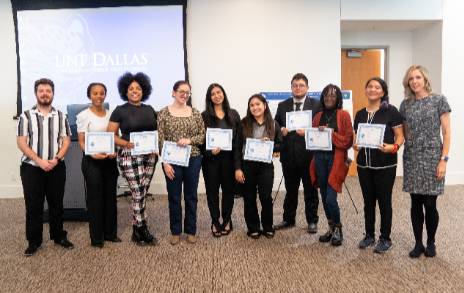
Seven students from the School of Liberal Arts and Sciences traveled to Lubbock, TX, for the annual Texas Tech University Research Conference (TTURC). At the same time, two students went further west for the National Council on Undergraduate Research (NCUR) in Long Beach, CA.
From the desert-like conditions of West Texas to the sandy beaches of Southern California, these off-campus visits are not about fun and games. They are about showcasing important research that could significantly impact people’s lives.
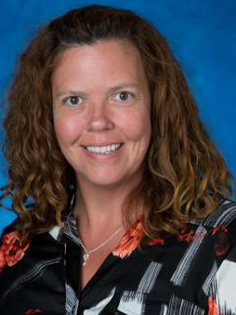
“It’s not pretend; they’re doing science,” said Dr. Donna Hamilton, associate professor of biology in the Department of Natural Sciences at UNT Dallas School of Liberal Arts and Sciences.
On campus, the 2024 UNT Dallas Student Research Symposium served as a platform for 18 student researchers to shine. These students presented a wide range of projects, some of which had already garnered attention at TTURC and NCUR, showcasing the depth and diversity of research at UNT Dallas.
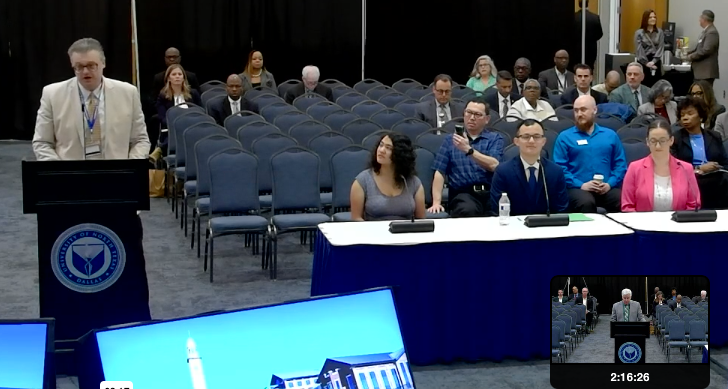
Also on campus, three students had the privilege of presenting their research projects to the UNT System Board of Regents when they met at UNT Dallas in May. Dr. Mario Casa de Calvo, Interim Dean of the School of Liberal Arts and Sciences, introduced them as “some of our finest undergraduate scholars.”
At each meeting, regents enjoy hearing stories of success in the “Spotlight on Students” portion of their agenda. “As a lifelong educator, and a believer in public education, you make my heart proud,” said regent Dr. Cathy Bryce. “It’s so fun to hear about the research going on (at UNT Dallas). You’re educating me. I am so impressed,” said Dr. Michael R. Williams, UNT System Chancellor.
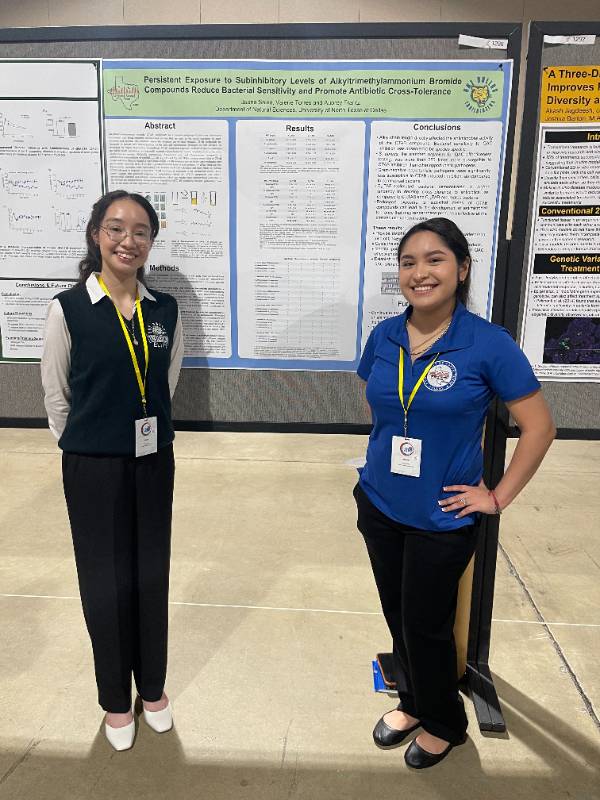
For senior Juana Salas and sophomore Valerie Torres, their journey to NUCR in California began with an open invitation from Provost Betty Stewart. After submitting an abstract, they were selected to present their research on CTABs, which are contained in personal care products that consumers buy in stores or online. It was the first time either had traveled outside Texas and the first time they flew in an airplane.
The pair credits their faculty advisor, Dr. Aubrey Frantz, an assistant professor of biology in the Department of Natural Sciences at the School of Liberal Arts and Sciences, for preparing them well. “She is a perfectionist in the best sense, so we knew our material backward and forward,” said Salas.
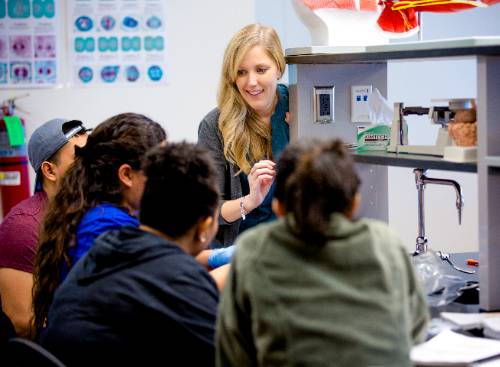
She and Torres presented to individuals and groups who stopped to view their research poster and hear their explanation of the CTABs project (more details later). Salas said their greatest reward was “seeing people understand our presentation and why it is applicable to the real world.”
The students who presented at TTURC in Lubbock included Isabelle Chung, Fatima Enriquez, Nicole Everitt, Connor Hester, MeSha McClanahan, Asia Penelton, and Hope Rico. Chung was mentored by Dr. Frantz; Everitt by Dr. Richard Chandler; Hester by Dr. Mehdi Eslamieh; Enriquez, McClanahan, Penelton, and Rico by Dr. Nicholas Lorusso.
“It’s pretty prolific,” said Dr. Muhammed Yousufuddin, an associate professor in the Department of Natural Sciences and colleague of the four mentors. “It’s high level, tailored to the audience.”
Most expenses for the trips to Lubbock and Long Beach were paid with funding from the Louis Stokes Alliances Minority Program (LSAMP) Scholar Program through the National Science Foundation; the Dean’s Office covered the costs of Enriquez’s visit to Lubbock.
One of LSAMP’s goals is to increase the amount of STEM degrees earned by underrepresented populations. The UNT Dallas BAT-LSAMP Scholarship Program partners with Texas Tech University, Dallas College, South Plains College, and Texas Southmost College to provide programs, resources, academic experiences, and financial support to students pursuing STEM degrees.
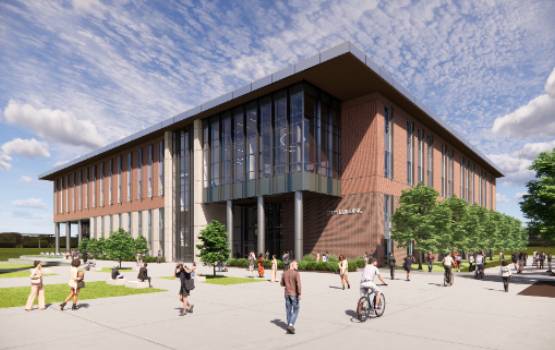
A new $100 million dollar state-of-the-art STEM Building is currently under construction at UNT Dallas, which will provide pathways to healthcare and medical careers and boost the pipeline of career-ready professionals for the North Texas workforce.
“This kind of mentorship is the greatest gift we can give our students,” said Dr. Casa de Calvo. “One of the traits that sets UNT Dallas apart is our faculty’s joy in working directly with undergrad students on research, which is a very rare attribute for a public institution of higher education.”
Student Research Symposium participants included Christopher Blair, Melany Carpio, Jesus E. Cazares, Isabelle Chung, Naphtali Duarte, Keiona Ellzey, Nicole Everitt, Adilene Garibay, Jtermal Harris, Connor Hester, MeSha McClanahan, Diana Paulin, Asia Penelton, Hephzibah Sajeeth, Juana Salas, Nekiaya Sims, Shanice Smith and Valerie Torres.
“They’re all discovering novel things,” said Dr. Hamilton.
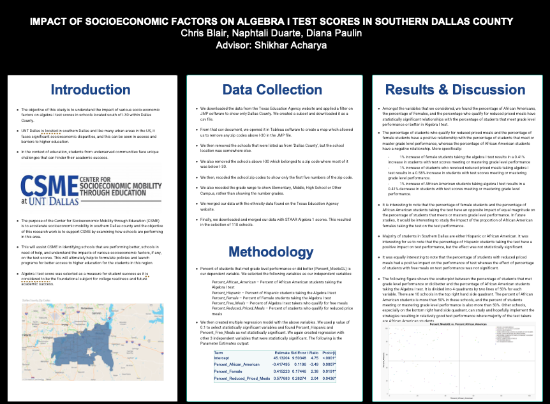
Indeed, the research displayed at the Symposium spanned a wide spectrum of subjects. Blair, Duarte and Paulin, with faculty advisor Dr. Shikhar Acharya, an assistant professor of business analytics at the UNT Dallas School of Business, explored the relationship between socioeconomic factors and algebra test scores of Dallas ISD students at schools south of I-30.
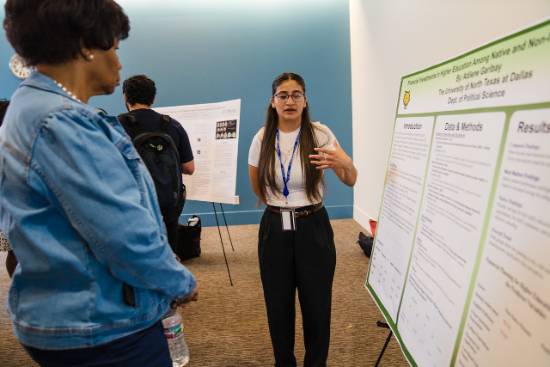
Other projects also explored connections between finances, education, and health. Garibay, with faculty advisor Dr. Aaron Bartula, an associate professor in the Department of Criminal Justice and Sociology in the School of Liberal Arts and Sciences, examined how much money Hispanic parents save and spend on their children’s education.
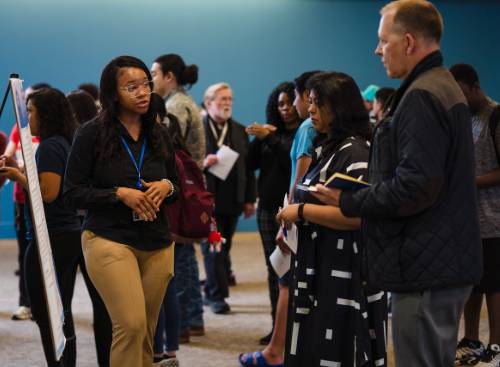
Sims, with faculty advisor Sean Hubbard, a lecturer in the Department of History and Political Sciences at the UNT Dallas School of Liberal Arts and Sciences, investigated the relationship between one’s health insurance and their likelihood of using an alternative financial service provider (AFSP) during the pandemic. AFSPs are businesses other than banks, such as check cashing outlets, money transmitters, car title lenders, payday loan stores, pawnshops, and rent-to-own stores.
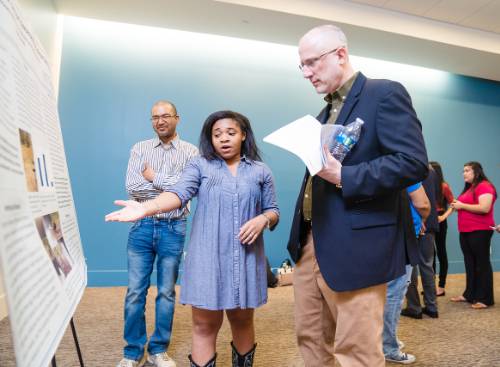
Three research projects looked at different aspects of decomposition and biodegradation. Penelton, with faculty advisor Dr. Nicholas Lorusso, an assistant professor in the Department of Natural Sciences, focused on the ecological impact of a decaying pig carcass on nearby animal populations and whether some of those animals contribute to the pig’s decomposition. Carrion, a term for decomposing wildlife, has the potential to influence food webs, which are the feeding relationships among species in a community.
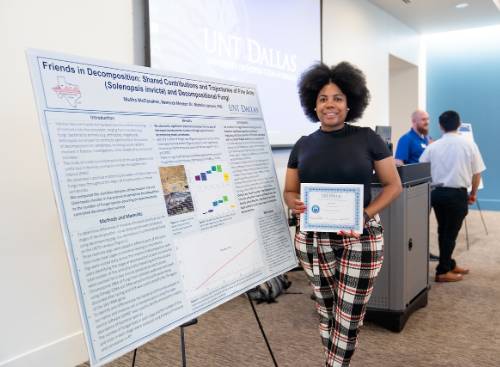
Pigs were also used by McClanahan and Lorusso to probe how fire ants and fungi affect decomposition and their relationship to each other as the carrion deteriorates.
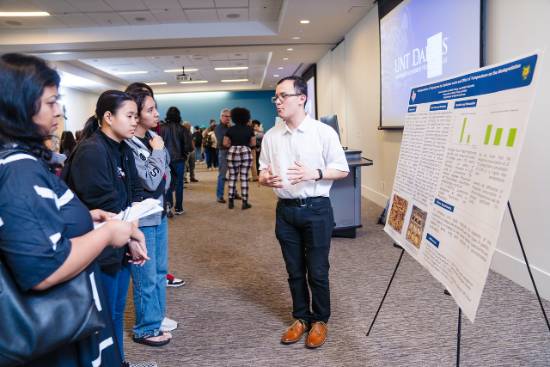
Hester, with faculty advisor Mehdi Eslamieh, a lecturer in the Department of Natural Sciences, studied the biodegradation of polystyrene, a type of plastic that is a major source of pollution worldwide. This project analyzed how the larvae of a superworm known as Zophobasas can affect the biodegradation of polystyrene. In his remarks at the Board of Regents meeting, Hester said he has a "love of learning, a desire to help others."
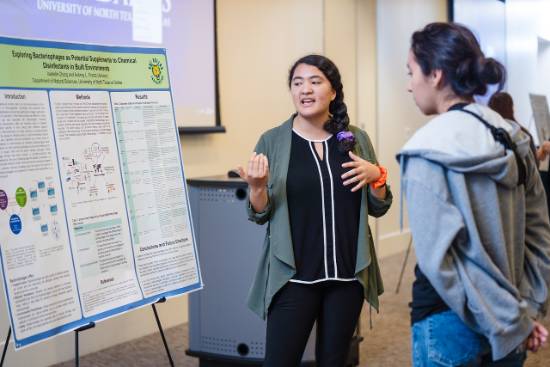
Chung, with faculty advisor Dr. Frantz, delved into chemical disinfectants used by consumers, which increased during the pandemic. They chemicals are active for only a short time on cleaned surfaces, making them ineffective against recontamination. Studies show bacteria are becoming more resistant to these antimicrobial and antibiotic products.
Chung told the Board of Regents she "was really looking for a research opportunity, it is very important to me."
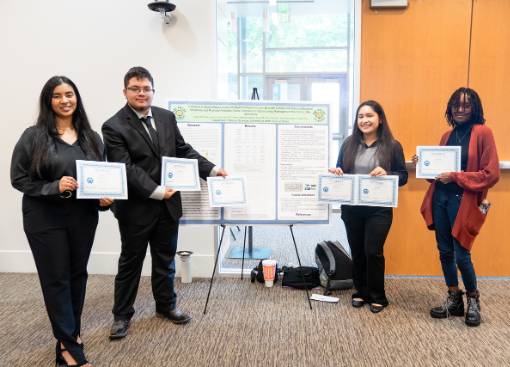
From bacteria and fungi to worms and wildlife, the research expanded to humans, specifically their skin. The team of Cazares, Ellzey, Sajeeth, Salas, Smith and Torres, with faculty advisor Dr. Frantz, analyzed CTABs, the active ingredients in many personal care and hygiene products. They wanted to determine whether CTABs affect bacteria found on skin and hard surfaces.
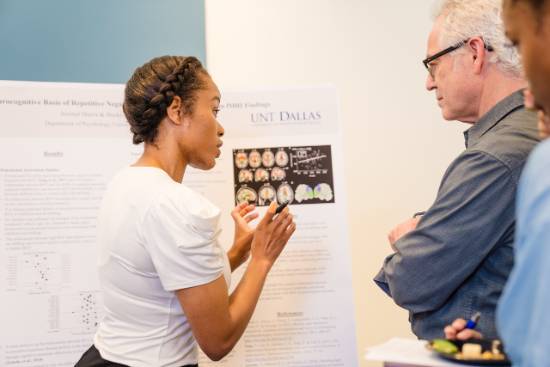
Moving from the outside to the inside of the human body, Harris and faculty advisor Dr. Heekyeoing Park, an assistant professor in the Department of Psychology at the UNT Dallas School of Liberal Arts and Sciences, explored Repetitive Negative Thinking (RNT), a condition common in people with depression and/or anxiety.
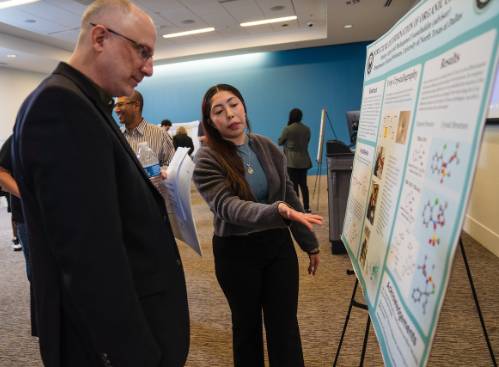
The spirit of collaboration spread beyond the boundaries of the UNT Dallas campus to Rice University in Houston. Carpio, with faculty advisor Yousefuddin, set out to confirm the structure of organic crystals provided by Rice researchers. The Rice team synthesized organic compounds, grew the crystals, and submitted them to UNT Dallas for inspection.
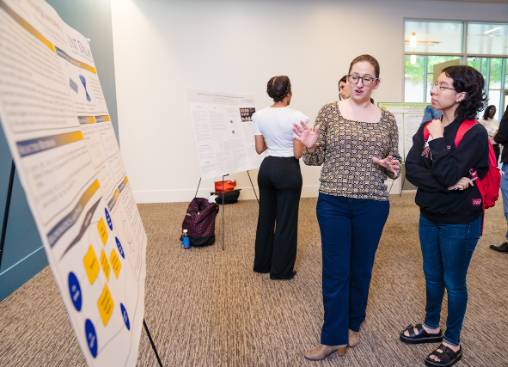
Everitt’s research, with faculty advisor Dr. Richard Chandler, an associate professor in the Department of Mathematics and Information Sciences and Head of Mathematics, involved mathematics and quantum mechanics. The goal was to analyze a mathematical structure known as an algebra that appears in quantum mechanics. These algebras are used to understand angular momentum, particle spin, and other principles and equations. Using geometry, Everitt and Chandler performed the analysis and compared their results to those of a similar classification by Chandler and a different research partner in 2020. In the Board of Regents meeting, Everitt said this was a "once in a lifetime opportunity."
With such a variety of projects and meticulous attention to detail, researchers who presented this year, both on and off campus, reflect the commitment of the university and the dedication of our students.
"UNT Dallas is an institution of access and opportunity that utilizes high-impact educational practices for skill and knowledge development, which in turn facilitates students’ academic, personal, and professional growth,” said Dr. Casa de Calvo.
That kind of growth is certain to generate even more fascinating research in the 2024-25 academic year and beyond.